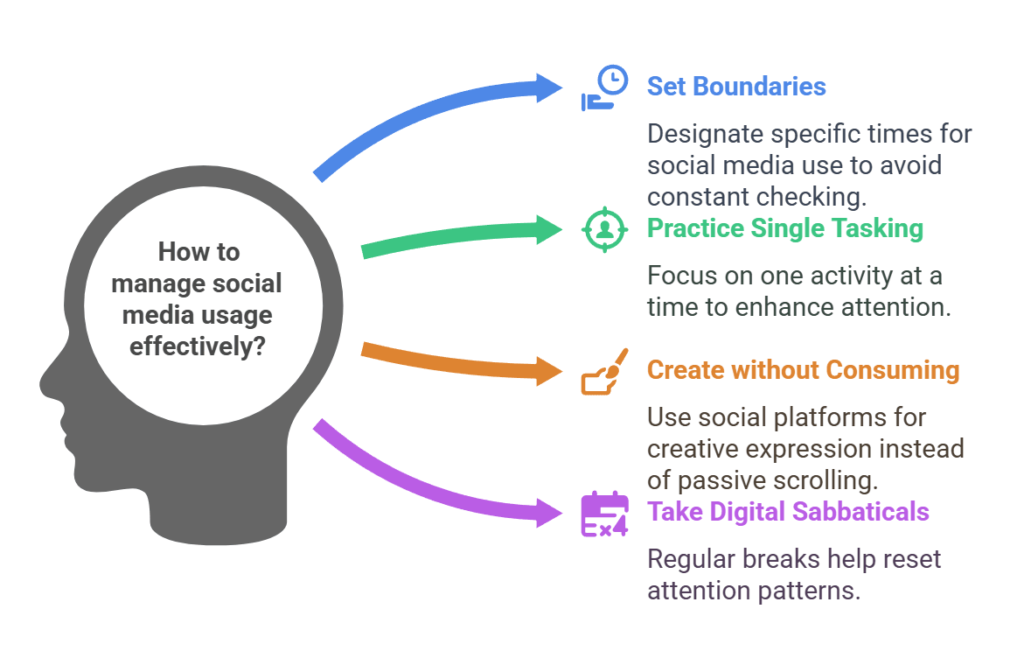
In a world where the average teen spends over 4 hours daily scrolling through feeds, our relationship with social media has evolved from casual entertainment to a cognitive partnership. But what happens when this digital companion becomes a constant presence in our neural networks? Let’s explore how social media is rewiring our brains and what it means for our cognitive future.
The Neural Rewiring Project.

Your brain isn’t static—it’s constantly adapting to your environment. And social media creates quite the environment.
Research shows that regular social media use correlates with changes in gray matter in brain regions responsible for attention, memory formation, and emotional regulation. A study found that just six weeks of intensive online engagement caused measurable reductions in the orbitofrontal cortex—the brain area crucial for impulse control.
Think about it: when you’re jumping between Instagram, Twitter, and TikTok while simultaneously responding to notifications, your brain is in a perpetual state of multitasking. This isn’t just changing what you think about—it’s changing how you think.
Attention: The Vanishing Resource.
Remember when you could read a book for hours without checking your phone? That ability might be fading faster than you realize.
Research from Oxford University found that constant exposure to digital stimuli causes attention deficits and mental fatigue. Even more striking, our average attention span has dropped from 12 seconds to 8 seconds over a 13-year period.
The irony? Despite all this practice at multitasking, we’re actually getting worse at it. A comprehensive analysis of 41 studies showed that frequent media multitaskers perform significantly worse on cognitive tests than light users. The constant switching trains your brain to be more distractible, not more efficient.
Memory: Outsourcing Our Past.
“Why remember when I can Google it?” This mindset is reshaping how our memory systems work.
Social media affects what researchers call “transactive memory”—how your brain decides what information to store internally versus externally. With social platforms always available, we’re increasingly relying on digital tools rather than internal memory processes.
Ironically, while millions use social media to document experiences, research shows that using social apps to capture a moment may actually diminish your memory of it. The act of documenting can pull you out of the experience itself, leaving you with a digital souvenir but a hazier personal recollection.
The Age Factor: Not All Brains Respond Equally.
The impact of social media on your cognitive abilities depends significantly on your age.
Young Brains: Vulnerable Territory.

For children and adolescents with developing brains, the stakes are particularly high. The first longitudinal study of media multitasking in young people found that frequent multitasking behaviors predict the development of attention deficits specifically in early adolescents.
Psychologist Tuğçe Doğru notes that heavy technology use causes both acute and long-term changes in attention and memory. The brain, like a muscle, needs challenges to stay strong, and consistently consuming low-effort content may lead to cognitive decline.
Older Adults: The Surprising Upside.
Plot twist: for older adults, social media might actually boost cognitive function. A study examining social media engagement among adults aged 65+ found improvements in processing speed and inhibitory control after just four weeks of social media training.
Participants showed significant improvement in their ability to ignore irrelevant stimuli—a cognitive skill that typically declines with age. The process of learning to navigate social media environments may provide sufficient cognitive stimulation to offset age-related declines.
Digital Dementia: Should We Be Worried?
Some experts have coined the term “digital dementia” to describe cognitive changes associated with technology overuse. While not a formally recognized clinical condition, research suggests that excess technology use can lead to dementia-like changes.
A recent study found that more than 4 hours of screen time daily was associated with an increased risk of vascular dementia, Alzheimer’s disease, and all-cause dementia. Higher levels of daily screen time were linked to physical changes in certain brain areas.
However, the type of digital activity matters—passive behaviors like watching videos increased dementia risk, while cognitively active digital activities were associated with lower risk. This distinction highlights the importance of how social media is used rather than merely how much.
Finding Balance in the Digital Age.
The research presents a complex picture with both potential benefits and risks. Evidence suggests that excessive social media use may negatively impact attention, prospective memory, and certain executive functions. For developing brains, these effects may be particularly concerning.
However, strategic social media engagement can offer cognitive benefits, especially for older adults. The social connection facilitated by these platforms may also have indirect positive effects through reduced isolation and increased mental stimulation.
How we engage with social media may be more important than whether we use it at all. Research shows that routine social media use—integrated into everyday activities mindfully—appears positively associated with well-being outcomes, while emotional attachment to social media—characterized by checking excessively out of fear of missing out—is negatively associated with health.
Your Cognitive Future: Taking Control.
Want to maintain your cognitive edge while still enjoying social media? Try these evidence-based approaches:
Set boundaries: Designate specific times for social media use rather than constant checking.
Practice single tasking: Focus on one activity at a time to strengthen your attention muscles.
Create without consuming: Use social platforms for creative expression rather than passive scrolling.
Take digital sabbaticals: Regular breaks from social media can help reset attention patterns.
Be age-appropriate: If you’re a parent, limit screen time for young children whose brains are still developing critical neural pathways.
The pervasiveness of social media in modern life makes understanding its long-term cognitive impacts an urgent priority. While complete avoidance of these platforms may be neither practical nor desirable for most people, developing mindful engagement strategies may help maximize cognitive benefits while minimizing potential harms to our most essential mental faculties.
What’s your relationship with social media? Have you noticed changes in your attention or memory? Share your experiences in the comments below.


0 Comments